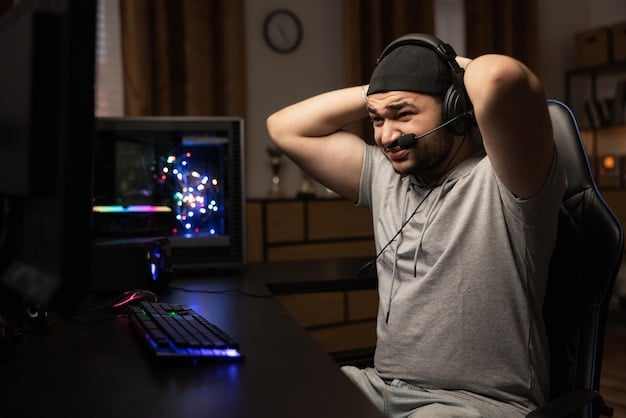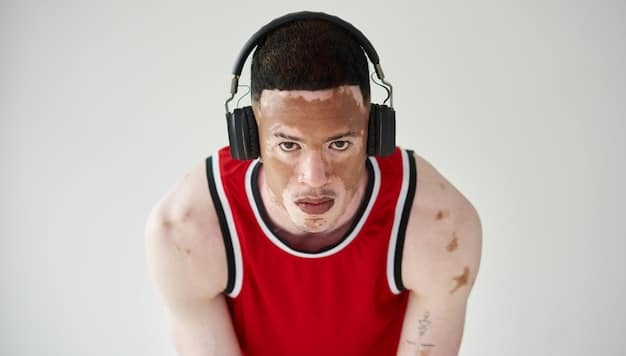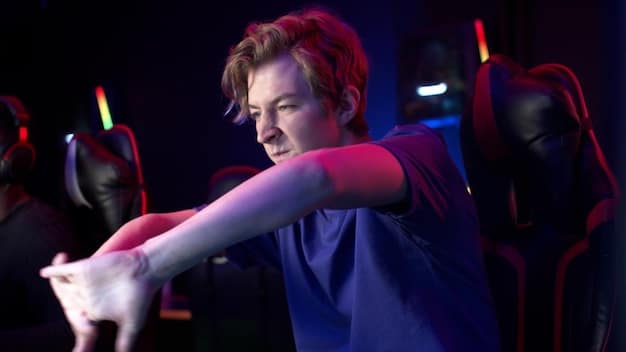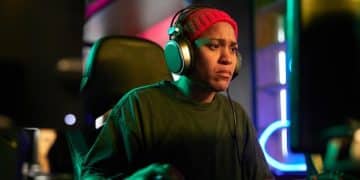Esports Athlete Burnout: Strategies to Extend Your Career Beyond 5 Years

Esports athlete burnout is a critical issue that can significantly shorten a player’s competitive career. This article explores three proven strategies to help esports athletes extend their competitive careers beyond five years by focusing on mental health, physical wellness, and strategic career management.
The high-stakes world of esports demands intense focus, relentless practice, and constant performance under pressure. But what happens when the passion fades, replaced by exhaustion and diminishing returns? This is the harsh reality of esports athlete burnout, a phenomenon that can prematurely end promising careers.
Can competitive career extend beyond five years? Absolutely and this article will address
**esports athlete burnout**, providing three tailored strategies designed to not only combat burnout but also to pave the way for a sustainable and fulfilling esports journey. Let’s explore exactly how.
Understanding Esports Athlete Burnout
Esports burnout is a state of emotional, physical, and mental exhaustion caused by prolonged or excessive stress and pressure in the competitive gaming environment. Unlike traditional sports, esports demands constant cognitive engagement, rapid decision-making, and extended periods of sedentary activity, creating a unique set of challenges for athletes.
Factors Contributing to Burnout
Several factors contribute to burnout in esports, including intense training schedules, lack of physical activity, poor diet, constant pressure to perform, social isolation, and financial instability. Esports athletes often face unrealistic expectations from themselves, their teams, and their fans, leading to chronic stress and anxiety.
The Impact of Burnout on Performance
Burnout not only affects an athlete’s mental and physical health but also significantly impairs their performance. Symptoms of burnout include decreased focus, impaired decision-making, reduced reaction time, increased errors, and decreased motivation. These symptoms can lead to a decline in competitive results, loss of team standing, and ultimately, career termination.
- Decreased Focus: Burnout reduces an athlete’s ability to concentrate, leading to mistakes and missed opportunities during gameplay.
- Impaired Decision-Making: Exhaustion impairs cognitive functions, making it difficult to make quick and effective decisions in critical moments.
- Reduced Reaction Time: Physical and mental fatigue slows down reaction times, putting the athlete at a disadvantage against their opponents.
- Decreased Motivation: Loss of passion and enthusiasm for the game can lead to a decline in training effort and overall performance.

Recognizing and addressing the factors contributing to esports athlete burnout is the first step toward extending a player’s competitive career. By implementing proactive strategies to manage stress, improve physical health, and foster a healthy lifestyle, esports athletes can mitigate the risks of burnout and achieve long-term success.
Strategy 1: Prioritize Mental Well-being
Mental health is a critical component of an esports athlete’s overall well-being and longevity. The pressure to perform, maintain a public image, and navigate team dynamics can take a significant toll on an athlete’s mental state. Prioritizing mental well-being involves implementing strategies to manage stress, anxiety, and emotional exhaustion.
Seeking Professional Support
One of the most effective ways to manage mental health is to seek professional support from therapists, counselors, or sports psychologists. These professionals can provide athletes with tools and techniques to cope with stress, anxiety, and other mental health challenges. Regular therapy sessions can help athletes develop a healthy mindset and maintain emotional stability.
Mindfulness and Meditation Techniques
Mindfulness and meditation techniques have been shown to reduce stress and improve focus. Incorporating mindfulness practices into daily routines can help athletes stay grounded, manage their emotions, and maintain a positive outlook. Simple exercises like deep breathing, body scans, and guided meditation can significantly improve mental well-being.
- Consistent sleep schedule: Establish a regular sleep-wake pattern to regulate the body’s natural sleep cycle.
- Limit screen time before bed: Reduce exposure to electronic devices at least an hour before sleeping, as the blue light emitted by screens can disrupt normal sleep patterns.
- Create a relaxing bedtime routine: Engage in calming activities before sleeping, such as reading or meditation, to prepare for restful sleep.
Prioritizing mental well-being is not a sign of weakness but a proactive approach to managing the unique pressures of esports. By seeking professional support, practicing mindfulness, and fostering a positive mindset, esports athletes can build resilience and maintain a healthy mental state.
Strategy 2: Optimize Physical Health and Fitness
Physical health is an often-overlooked aspect of esports performance. Prolonged periods of sitting, lack of physical activity, and poor dietary habits can lead to a range of health issues that negatively impact an athlete’s performance. Optimizing physical health involves incorporating regular exercise, maintaining a balanced diet, and ensuring adequate rest and recovery.
Regular Exercise and Physical Activity
Regular exercise is essential for maintaining physical and mental health. Incorporating physical activity into daily routines can improve cardiovascular health, increase energy levels, reduce stress, and improve sleep quality. Simple exercises like walking, jogging, swimming, or strength training can significantly benefit esports athletes.
Balanced Nutrition and Hydration
A balanced diet provides the nutrients needed to support physical and cognitive function. Esports athletes should focus on consuming whole foods, including fruits, vegetables, lean proteins, and whole grains. Proper hydration is equally important, as dehydration can lead to fatigue, headaches, and impaired cognitive performance.
- Improve energy levels: Fitness combats fatigue and increases stamina, allowing athletes to endure long practice sessions and tournaments with sustained energy.
- Sharpen focus: Exercise improves blood flow to the brain, enhancing cognitive functions such as concentration, reaction time, and decision-making.
- Build resilience: Physical health promotes stress management and mental resilience, helping athletes cope with challenges and bounce back stronger from setbacks.
Optimizing physical health is a crucial aspect of extending an esports career. By incorporating regular exercise, maintaining a balanced diet, and prioritizing rest and recovery, esports athletes can improve their physical and mental well-being, leading to enhanced performance and long-term success. A healthy diet is essential to prevent esports athlete burnout.

Strategy 3: Strategic Career Management for Longevity
Strategic career management involves making informed decisions about training, competition, and personal development to ensure long-term sustainability and success in esports. This includes setting realistic goals, managing performance expectations, and planning for the future.
Prioritizing Deliberate Practice Over Excessive Training
Deliberate practice involves focusing on specific skills or areas for improvement with targeted feedback and repetition. Rather than engaging in excessive training sessions that lead to exhaustion and diminishing returns, esports athletes should prioritize deliberate practice to maximize their learning and development.
Establishing Boundaries and Time Management
Setting boundaries between work and personal life is crucial for preventing burnout and maintaining a healthy balance. This involves establishing clear limits on training hours, competition schedules, and social media engagement. Effective time management skills can help athletes prioritize tasks, allocate resources efficiently, and avoid overcommitment.
- Financial Planning: It’s important to develop a financial plan for consistent income management and investment management.
- Alternative Career Moves: Consider streaming, coaching or content creation to move into alternative areas of the market.
- Brand Building: Build a strong brand around their name to secure sponsorships and partnerships.
Strategic career management is essential for extending an esports career beyond five years. By prioritizing deliberate practice, establishing boundaries, and planning for the future, esports athletes can build a sustainable and fulfilling career that aligns with their long-term goals and values. Using these strategies will help to prevent esports athlete burnout.
| Key Point | Brief Description |
|---|---|
| 🧠 Mental Well-being | Prioritize mental health with therapy and mindfulness. |
| 💪 Physical Fitness | Optimize health with exercise, diet, and rest. |
| 🗓️ Career Management | Manage training and set realistic goals. |
| 🎯 Strategic Practice | Focus on deliberate practice for skill improvement. |
Frequently Asked Questions
Several factors contribute to burnout, including intense training, social isolation, and constant pressure to perform. Lack of physical activity and poor diet can also negatively affect an athlete’s well-being.
Mental health professionals offer counseling and therapy to address issues like stress and anxiety. They also help athletes develop coping strategies, improve focus, and foster a positive mindset.
Physical fitness boosts energy levels and reduces stress, helping athletes handle the demands of intense training and competition. Regular exercise improves focus, reaction time, and overall cognitive performance.
Strategic career management includes setting realistic goals, managing performance expectations, and implementing time management skills. Planning for the future and maintaining a healthy balance between work and personal life are also crucial.
Deliberate practice involves targeted exercises with feedback, maximizing learning and preventing excessive training that leads to exhaustion. It focuses on improving specific skills to enhance performance and prevent burnout.
Conclusion
By addressing the multifaceted challenges of the esports world through mental health support, physical fitness, and strategic career planning, athletes can significantly mitigate the risks of esports athlete burnout. These three strategies are the foundation for a sustainable and fulfilling career in esports.
With a commitment to these practices, athletes will improve their life quality and also pave the way for a longer, more prosperous journey in the world of competitive gaming.




![Mastering [your chosen topic] in PC Gaming: A Deep Dive Mastering [your chosen topic] in PC Gaming: A Deep Dive - Cover Image](https://arcanenews.com/wp-content/uploads/2025/07/arcanenews.com_11_1753889991_8be9b385_cover-360x180.jpg)
